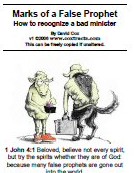Congregating because we Love is a tract about why we attend church. Our relationship with our brethren in Christ is highly integrated with our salvation. This tract, Congregating because we Love, explains part of that. Congregating because we Love
By Pastor-Missionary David Cox
[CH15] v2©2013 www.coxtracts.com
You may freely reprint and copy this tract for free distribution
Psa 122:1 I was glad when they said unto me, Let us go into the house of the LORD.
Psa. 50:5 Gather my saints together unto me; those that have made a covenant with me by sacrifice.
Salvation is often misunderstood. When God saved us, He made us part of the redeemed and the body of Christ. Salvation unites us with the community of the redeemed, the community of faith, with the saved by Jesus Christ. Believers get together the day God chose (Sunday) for the purposes He chose. Salvation is not something isolated from the present until after death, but is something that is active, dynamic, and fills our life from the moment of salvation until our death and for all eternity.
The life of every believer should be centred in communion with the other redeemed in the church, and afterwards in heaven. Heaven is to live together with God and the rest of the redeemed. God had his purposes in saving us, and the main purpose is to form us into part of His work (extending the kingdom of God) for His glory. We should shine our best for God before the world. Continue reading







